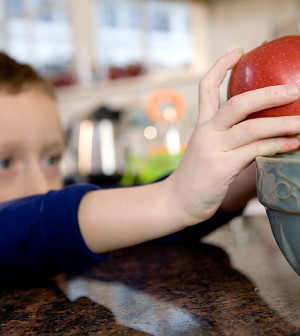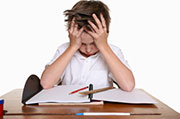- Could Your Grocery Store Meat Be Causing Recurring UTIs?
- Are You Making This Expensive Thermostat Error This Winter?
- Recognizing the Signs of Hypothyroidism
- 10 Strategies to Overcome Insomnia
- Could Artificial Sweeteners Be Aging the Brain Faster?
- Techniques for Soothing Your Nervous System
- Does the Water in Your House Smell Funny? Here’s Why
- Can a Daily Dose of Apple Cider Vinegar Actually Aid Weight Loss?
- 6 Health Beverages That Can Actually Spike Your Blood Sugar
- Treatment Options for Social Anxiety Disorder
Could Your Child Have Migraines?


Determining if your child has migraine headaches may be difficult because the symptoms aren’t always obvious, experts say.
A child who complains about severe headaches should be seen by a doctor, but there are other symptoms that parents may not associate with migraine, according to the American Migraine Foundation. They may include nausea and vomiting, abdominal pain, and sensitivity to light, sounds and odors.
Another clue: wanting to lie down in a dark room, says the foundation.
“While migraine can be extremely debilitating, it is also often treatable. The key thing is to get your child to a headache specialist if he or she exhibits potential migraine symptoms,” said Dr. David Dodick in a foundation news release. He is professor of neurology at the Mayo Clinic College of Medicine in Scottsdale, Ariz., and the foundation’s chair.
Dr. Marcy Yonker, a pediatric neurologist at Phoenix Children’s Hospital, said, “Parents should be alert to complaints from their child of frequent headaches. This could indicate migraine or another serious condition.”
Migraine headaches tend to run in families. About 70 percent of children and teens with migraine have an immediate family member who has migraines or had them as a child, the foundation noted.
Migraine triggers can occur spontaneously, during sleep or with certain foods, with changes in weather or altitude. They can also occur from stress or fluctuating hormone levels.
Many adults with migraines don’t realize that their severe headache is actually a migraine. Only about half of adults with migraine get a migraine diagnosis.
“Migraine in children tends to be underdiagnosed and undertreated, Yonker said.
“If you have a child with bad headaches that you suspect may be migraine, think about your own headache history as a guide to your child’s complaints and make an appointment with a migraine specialist for a proper diagnosis,” she advised. “It may make all the difference.”
More information
The American Academy of Family Physicians has more about migraine headaches.
Source: HealthDay
Copyright © 2026 HealthDay. All rights reserved.










